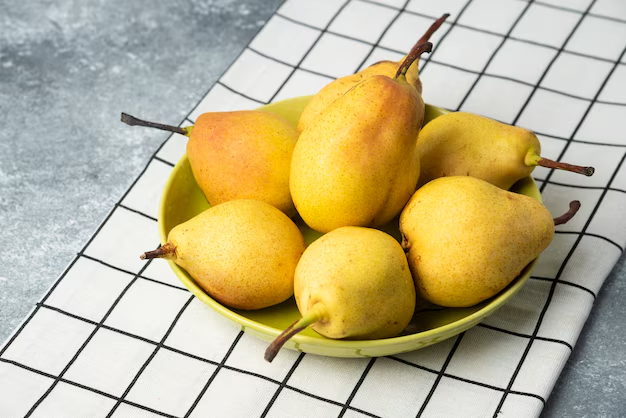Should You Keep Pears in the Fridge? The Complete Guide to Storing Pears
Picture this: you’ve just returned from the farmers’ market with a basket of perfectly plump pears. But now comes the age-old question: Should you store these pears in the refrigerator or keep them on the countertop? The path you choose can make a significant difference in your pears' taste, texture, and longevity. Dive into this comprehensive guide to uncover the best storage practices for pears, and learn how to enjoy these delightful fruits at their absolute best.
🍐 The Nature of Pears: Understanding the Fruit
Before tackling the storage conundrum, it’s essential to understand what makes pears unique. Pears are climacteric fruits, meaning they continue to ripen after being picked. This characteristic, common among fruits like bananas and avocados, suggests that storage conditions directly influence how pears ripen and taste when consumed.
Types of Pears and Their Characteristics
Bartlett Pears
- Known for their smooth, sweet flavor and juicy texture.
- Ripen quickly and have a short shelf life.
Bosc Pears
- Firm and dense with a honey-sweet flavor.
- Known for their long shelf life and suitability for baking.
D’Anjou Pears
- Sweet and slightly tangy, with a firm texture.
- Generally have a longer shelf life compared to Bartletts.
Understanding these varieties helps you make informed decisions about how and when to store them, preserving their unique traits and flavors.
📦 To Refrigerate or Not to Refrigerate?
This question can spark quite the debate. The decision to refrigerate pears largely depends on their ripeness and intended use. Let’s explore both sides of storing pears inside and outside the fridge.
Storing Pears on the Countertop
Benefits of Countertop Storage
- Speedier Ripening: Ambient temperatures accelerate the ripening process, enhancing flavors and textures.
- Convenience: Easier to monitor and consume when at peak ripeness.
Ideal Conditions
- Keep them at room temperature, away from direct sunlight and heat sources.
- Store without other fruits, especially bananas, to avoid over-ripening.
When Refrigeration is Beneficial
When to Refrigerate
- Ripe Pears: Once pears have ripened to your liking, refrigeration slows down further ripening, extending their edible period.
- Overstock: If you have an abundance of pears, refrigerating unripe ones can delay their ripening and spoilage.
Proper Refrigeration Practices
- Place pears in the crisper drawer to regulate moisture levels and maintain freshness.
- Avoid storing near strong-smelling foods to prevent flavor absorption.
By employing these storage techniques, you’ll keep your pears at their best, artistically balancing ripeness and freshness.
🍽️ Practical Tips for Extending Shelf Life
Achieving the perfect pear experience doesn’t end with the right storage choice. Here are practical ways to extend their shelf life, reducing waste and enhancing enjoyment.
Ripening Pears
To quickly ripen pairs, place them in a paper bag with an apple or banana. This method traps ethylene gas, naturally emitted by these fruits, which promotes ripening. Check daily to ensure pears reach your desired ripeness.
Handling and Care
Gentle Handling
Handle pears carefully to prevent bruising, which can accelerate deterioration.
Washing
Wash pears just before eating, not when being stored, to avoid excess moisture that could lead to spoilage.
Preserving Pears
Freezing Pears
Peel, core, and slice pears before freezing. Blanche the slices for a few minutes, cool them in an ice bath, and store in airtight containers for long-term preservation.
Drying Pears
Dehydrate pear slices in the oven or a dehydrator, creating healthy snacks that last longer.
These techniques empower you to make the most of every pear, enjoying them fresh or transformed into tantalizing treats.
🗒️ Summary of Key Takeaways
Here’s a concise overview of the main points to help streamline your pear storage practices:
- 🍐 Consider the Ripeness: Store unripe pears at room temperature; refrigerate them once ripened.
- 🏠 Optimal Conditions: Keep them away from sunlight; avoid mixing with ethylene-producing fruits.
- 🥶 Refrigeration Tips: Utilize a crisper drawer for best results; ensure pears haven't reached peak ripeness.
- 🛠️ Preservation Methods: Explore freezing or drying to extend enjoyment beyond their natural shelf life.
🎯 Conclusion: Making Informed Choices
Understanding when and how to store pears can transform your fruit-eating experience. By applying these insights, you maximize pear flavor, texture, and longevity, ensuring every bite is as rewarding as intended. Whether you enjoy your pears fresh, in desserts, or as part of a savory dish, correct storage techniques ensure that every pear can be a memorable one.
Mastering the art of pear storage empowers you in the kitchen, giving you control over this delightful fruit’s ripening process. With these guidelines, you not only extend the life of your pears but also elevate their taste, ensuring that they remain a cherished staple in your fruit repertoire. So go ahead, enjoy your pears just the way you like them, confident that you are making the most of this luscious fruit. 🍐

